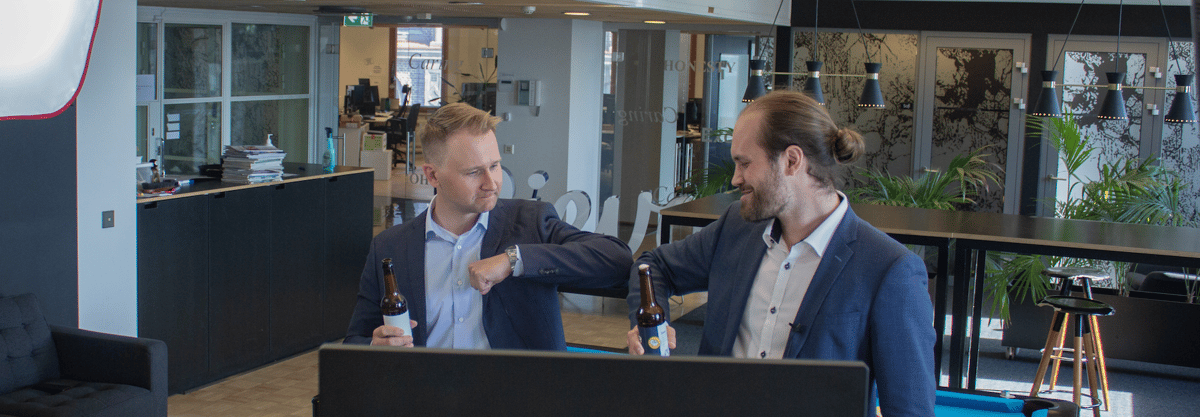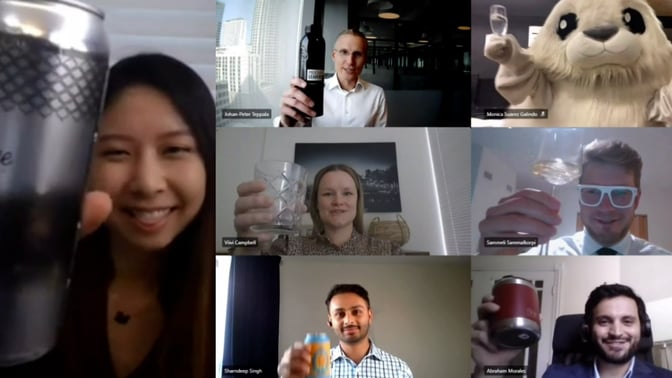
Events & Conferences
8 Tips for Hosting Awesome Online Events

Monica Suarez Galindo • Oct 7, 2020
Just another day in March at the office. We're happy to have just finished the International Women’s Day 2020 video when suddenly we hear that the COVID-19 pandemic had officially hit Finland, and that starting from the next day we needed to start working remotely from home.
"Brilliant" people like myself thought: “No panic. This will last two months tops... our SievoFriends event will happen in June 2020 just as planned.” Sure thing! So naturally, we ended up turning our SievoFriends on-site event into an online one.
Now, the marketing team had a haunting question:
How the heck do we do an online event?
Google didn’t help much. Of course, an outbreak that forced people to stay indoors happened for the first time in a century(?) and not much has been developed on the internet about online conferences yet.
Fortunately, after a lot of sweat figuring it out, today we're proud to say that we created not only one but two successful online events!
Here 8 tips to create successful online events:
1. Consider all preparations
Online events can have as many or even more things to consider while planning as on-site ones. There are so many things to think about that losing your mind is easy if you don’t structure the organization of your event first. For said reason, we highly recommend you to start by splitting preparation into 3 parts: Pre, During and Post-event.
- Pre-event: The event's landing page, the speakers and hosts to present, best agenda topics, schedule, online-event platform to use, budget, streaming resources, dry runs, AV equipment needed, set, visual branding and the event's promotion strategy.
- During: Agile communication with all teams and presenters, agenda follow-up, streaming team strategy on that day, Q&A live panel, social media strategy during the day and the wrap-up event activity.
- Post-event: On-demand sessions and landing page, thank you emails, on-demand event content marketing strategy and feedback gathering.
For each stage of the event think who will be doing it, what resources will it take and how much time you'll need in advance to make it happen.
2. Have a supportive team
There's a lot happening while planning an online event. So we suggest finding a person to take the “captain of the boat” role for your event. In our case, the awesome Galina Leväsluoto, Junior Event Manager for our SievoFriends events, mapped out everything we needed before the event and then proceeded to do one of the key pre-event steps:
Ask for help + delegate tasks.
To succeed you need an agile and supportive team.
In our case, Tuomo Vierros, Product Manager of our Data Flow team, was the go-to-Sievonian for tech that stood up and helped us with all the streaming knowledge and direction that we were lacking at the beginning. Same was true with our lovely presenter, hosts and behind the camera crews in both events: our Key Account Managers, Senior Consultants, Customer Development Managers, Summer Seals and the Leadership team that gave us a big hand during the whole production of the event. Because of this, we are proud and happy to affirm that only united & supportive teams can create successful events.

3. Follow the tech from the best
Learn from the most experienced online video streamers: YouTube gamers. Not much explanation needed really. Just follow the techniques used by them since they are by far the most developed in the streaming game out there. Check what they do and how they do it: From nice-looking consistent visuals to the gear needed for a stream. Their techniques saved us a lot of time.
4. Make it human looking
Please, please, please avoid all “futuristic” look and feel. During the start of the COVID-19 outbreak, we saw so many Sims-looking online events! An online event does not mean that you have to turn the ex-on-site venue to a virtual one, meaning also making little avatar people in front of stands. An online event means that real humans will be behind their computers, the least thing they need is more machine-looking visuals. People need human interactions. So the best way to go is to make your online guests feel closer to each other by showing real human faces.
This is the reason why we went for showing the faces of our Sievonians throughout all the SievoFriends branding, followed by an organic and home-made feel teaser that gathered our Sievonians sending words of support to our customers.
Important note: Consistency in your event's identity is key. Make sure to have your visual branding present in all event's touchpoints (invitations, slides, event landing page, emails, on-demand content, etc)
5. Create interactions
The special side of on-site events is the possibility to get to know new peers in your field and grow your network. This is something that online events have been missing for a long time. However, nowadays there are platforms that provide networking features to chat and video call with event's guests. So, if possible, use a platform that supports networking as a feature in their tool. We used Brella.
Interaction is important if you aim to make your participants stay at your event for a longer period of time. Consider that this applies also to the presentations, so try to make a space for Q&A after each session or even organize workshops where participants can interact with the presenter.
6. Promote your event's value
Whether you're ready or not with all the steps mentioned before, you should make sure to promote the event in advance in order to get people to register. Make sure to use your strongest social media platforms, direct emailing to your subscribers and your peers’ email signatures to make it happen.
People give up their time for events only if they think there are new things that are worth learning or updates they can't miss, so remember to share your event followed by a consistent message that clearly expresses the value your event will deliver to all its participants.
7. Rehearse
Dry runs before your event are a must. Don’t make the mistake of practicing only a day before the event but weeks ahead if possible, there are always last-minute things to consider and you might want to have some weeks still to get those in shape if needed. Give a clear explanation to your speakers and teams of what is happening during the whole day of the event and what they're expected to do and say at a certain time. Also, make sure you have everything ready for the online practice sessions and make your speakers feel that the dry run day is the actual online live event so if "mistakes" happen at that time, you all know how to handle it in advance for the real day of the event.
Very important note: Also have fun! The best part of practicing ahead with dry runs is that the lack of pressure at those moments creates spontaneity (especially when nobody but your streaming team is watching :D).
8. Shine & Celebrate!
The day of the event arrives, everything goes smoothly after so many dry-runs and you simply shine. By the end of the event take the time to celebrate your awesome speakers, their presentations, the crew in front and behind the cameras, and the new friends made before and during the event.

Online events are a bit new and even confusing to most of us. Hopefully these tips are helpful for you to start creating your own successful event. Remember to be organized, strategic and have fun in the process!
Personally, I enjoyed very much working closely (and virtually) to my colleagues during SievoFriends 2020 & SievoFriends Americas 2020. The success of these events happened thanks to every single one of them!

